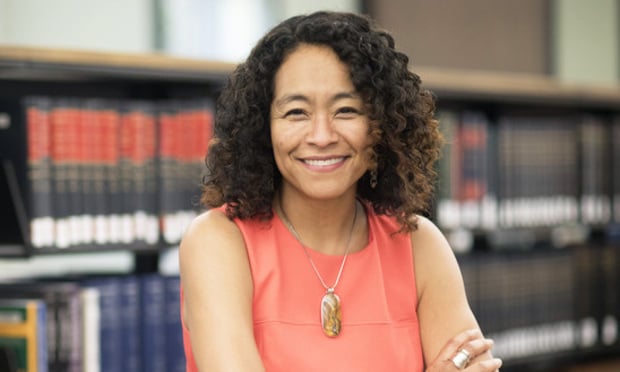Critics Link California's Bar Exam to Lack of Bench, Bar Diversity
"If we care about diversity and inclusion in the legal profession, and I will assume that we do, then the current bar exam cut score is simply unconscionable," L. Song Richardson, dean of the UC Irvine School of Law, told the Assembly Judiciary Committee Tuesday.
May 15, 2019 at 12:00 AM
4 minute read
 L. Song Richardson, dean of the UC Irvine School of Law. (Courtesy photo)
L. Song Richardson, dean of the UC Irvine School of Law. (Courtesy photo)
California's notoriously difficult bar exam came under fresh scrutiny Tuesday as critics told a legislative committee that the high marks required to pass are hurting efforts to diversify the state's legal profession and bench.
“If we care about diversity and inclusion in the legal profession, and I will assume that we do, then the current bar exam cut score is simply unconscionable,” L. Song Richardson, dean of the University of California, Irvine School of Law, told the Assembly Judiciary Committee.
Richardson was referring to California's bar exam passing score—known as the cut score—of 144. The number is the second-highest in the nation, behind Delaware's 145.
Statistics released last year by the bar show that, if the cut score on the July 2018 exam had been 135, the mean passing score of all states offering a test, the overall success rate would have jumped from 42 percent to 63 percent. Gains among certain ethnic groups would have been even more significant. One-hundred nineteen African American students scored 144 or better to pass the July 2018 bar exam. If the cut score had been 135, 268 African Americans would have passed, an increase of 125 percent.
“Because of our outlier cut score, many of our promising and talented law graduates are losing their jobs and increasing their debt,” Richardson said. “So it is abundantly clear that our abnormally high cut score adversely impacts the diversity of the legal profession.
“And if we were to reduce the cut score to at least the national average, we would immediately ensure that the lawyers entering the profession in California come closer to representing our population and also diversity of students who graduate from our law schools.”
State lawmakers convened Tuesday's hearing to consider why California's bar and bench do not reflect the diversity of the state's population. Latinos comprise the largest ethnic group in California at roughly 39 percent of the state's population. In 2017, the latest demographic figures available, more than 80 percent of attorneys licensed by the bar were white.
Former Gov. Jerry Brown emphasized diversity in his judicial picks. But after eight years of Brown's appointments, California's judges are still overwhelmingly white (66.percent) and male (64 percent).
Legislators heard from attorneys about barriers to a law school-preparing education and a lack of mentoring and networking opportunities for both students and young lawyers. But the discussion frequently turned back to the bar exam and, to a lesser extent the LSAT, as a “pipeline” problem, limiting the supply of minority students to the profession.
“The data is very, very clear in how these exams seem to be barring future leaders within the legal profession that represent the diversity of our state,” said Assemblyman David Chiu, D-San Francisco. “I think there are reasons on both sides on why things should or should not change, but from my perspective the burden of proof should lie with the status quo because things have to change.”
After an outcry from law school professors in 2017, bar leaders asked the Supreme Court to reconsider the cut score. Justices left the score at 144, saying they had not seen persuasive evidence, yet, to reduce it.
State bar officials are conducting a study of the skills new attorneys need to practice law in California. The results of that study are expected at the end of the year and could be used to re-formulate the bar exam, its content and cut score.
“We'll have more information to consider then,” Chief Justice Tani Cantil-Sakauye said in an interview from her San Francisco office Tuesday.
Richardson said the cut score should be temporarily reduced while the study continues “because the diversity of the legal profession in California that we say we care about depends upon it.”
The results of the February 2018 bar exam will be released on Friday.
This content has been archived. It is available through our partners, LexisNexis® and Bloomberg Law.
To view this content, please continue to their sites.
Not a Lexis Subscriber?
Subscribe Now
Not a Bloomberg Law Subscriber?
Subscribe Now
NOT FOR REPRINT
© 2025 ALM Global, LLC, All Rights Reserved. Request academic re-use from www.copyright.com. All other uses, submit a request to [email protected]. For more information visit Asset & Logo Licensing.
You Might Like
View All
Law Firms Look to Gen Z for AI Skills, as 'Data Becomes the Oil of Legal'

Law Firms Expand Scope of Immigration Expertise Amid Blitz of Trump Orders
6 minute read
Pearl Cohen Enters San Francisco Market Via Combination With IP Boutique
Trending Stories
- 1Uber Files RICO Suit Against Plaintiff-Side Firms Alleging Fraudulent Injury Claims
- 2The Law Firm Disrupted: Scrutinizing the Elephant More Than the Mouse
- 3Inherent Diminished Value Damages Unavailable to 3rd-Party Claimants, Court Says
- 4Pa. Defense Firm Sued by Client Over Ex-Eagles Player's $43.5M Med Mal Win
- 5Losses Mount at Morris Manning, but Departing Ex-Chair Stays Bullish About His Old Firm's Future
Who Got The Work
J. Brugh Lower of Gibbons has entered an appearance for industrial equipment supplier Devco Corporation in a pending trademark infringement lawsuit. The suit, accusing the defendant of selling knock-off Graco products, was filed Dec. 18 in New Jersey District Court by Rivkin Radler on behalf of Graco Inc. and Graco Minnesota. The case, assigned to U.S. District Judge Zahid N. Quraishi, is 3:24-cv-11294, Graco Inc. et al v. Devco Corporation.
Who Got The Work
Rebecca Maller-Stein and Kent A. Yalowitz of Arnold & Porter Kaye Scholer have entered their appearances for Hanaco Venture Capital and its executives, Lior Prosor and David Frankel, in a pending securities lawsuit. The action, filed on Dec. 24 in New York Southern District Court by Zell, Aron & Co. on behalf of Goldeneye Advisors, accuses the defendants of negligently and fraudulently managing the plaintiff's $1 million investment. The case, assigned to U.S. District Judge Vernon S. Broderick, is 1:24-cv-09918, Goldeneye Advisors, LLC v. Hanaco Venture Capital, Ltd. et al.
Who Got The Work
Attorneys from A&O Shearman has stepped in as defense counsel for Toronto-Dominion Bank and other defendants in a pending securities class action. The suit, filed Dec. 11 in New York Southern District Court by Bleichmar Fonti & Auld, accuses the defendants of concealing the bank's 'pervasive' deficiencies in regards to its compliance with the Bank Secrecy Act and the quality of its anti-money laundering controls. The case, assigned to U.S. District Judge Arun Subramanian, is 1:24-cv-09445, Gonzalez v. The Toronto-Dominion Bank et al.
Who Got The Work
Crown Castle International, a Pennsylvania company providing shared communications infrastructure, has turned to Luke D. Wolf of Gordon Rees Scully Mansukhani to fend off a pending breach-of-contract lawsuit. The court action, filed Nov. 25 in Michigan Eastern District Court by Hooper Hathaway PC on behalf of The Town Residences LLC, accuses Crown Castle of failing to transfer approximately $30,000 in utility payments from T-Mobile in breach of a roof-top lease and assignment agreement. The case, assigned to U.S. District Judge Susan K. Declercq, is 2:24-cv-13131, The Town Residences LLC v. T-Mobile US, Inc. et al.
Who Got The Work
Wilfred P. Coronato and Daniel M. Schwartz of McCarter & English have stepped in as defense counsel to Electrolux Home Products Inc. in a pending product liability lawsuit. The court action, filed Nov. 26 in New York Eastern District Court by Poulos Lopiccolo PC and Nagel Rice LLP on behalf of David Stern, alleges that the defendant's refrigerators’ drawers and shelving repeatedly break and fall apart within months after purchase. The case, assigned to U.S. District Judge Joan M. Azrack, is 2:24-cv-08204, Stern v. Electrolux Home Products, Inc.
Featured Firms
Law Offices of Gary Martin Hays & Associates, P.C.
(470) 294-1674
Law Offices of Mark E. Salomone
(857) 444-6468
Smith & Hassler
(713) 739-1250







